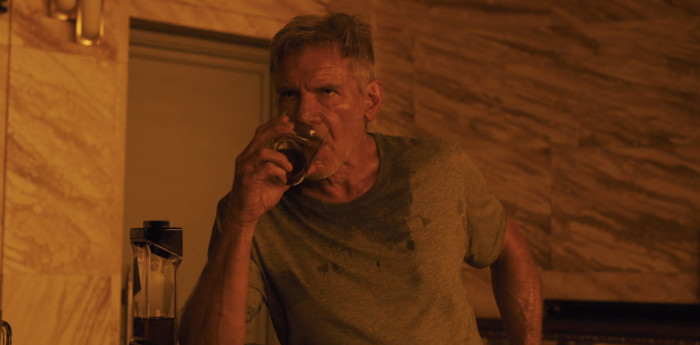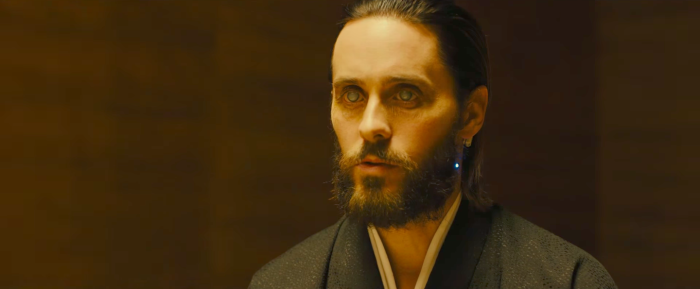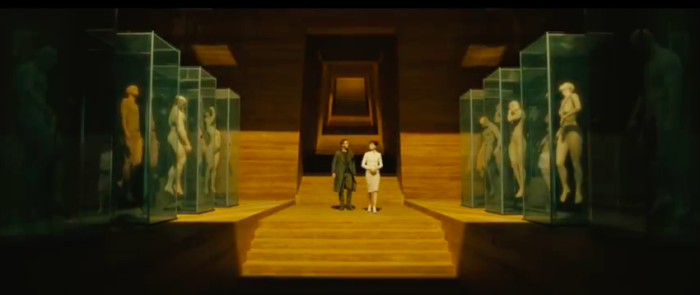The Quest To Keep 'Blade Runner 2049' Reviews Spoiler-Free And The Rise Of Spoiler Culture
In the age of Game of Thrones and Reddit, spoiler culture has become a dominating force in the film and TV communities, unleashing hordes of fans who chide outlets for "spoiling" a twist or pushing studios to mandate what their stars can and can't say to the press.
Warner Bros. has been keeping a particularly tight lid on Blade Runner 2049 spoilers, with one PR firm handing out strict guidelines to critics with a summary of five potential-spoiler talking points to avoid in their reviews. Critics bristled at the studio's misguided attempt to dictate the specifics of their reviews, and this has launched a heated discussion: What is spoiler culture, and is it dangerous to film?
Warner Bros.' marketing has done a stellar job so far of keeping audiences in the dark as to what Blade Runner 2049 is about. The cryptic teasers and previews give the bare minimum of story: Officer K (Ryan Gosling) is a LAPD blade runner on a mission to find former blade runner Rick Deckard (Harrison Ford), who went missing 30 years ago. But the two of them soon go on the run, hunted by Jared Leto's Niander Wallace, who seeks to build a replicant army of his own. But beyond that, nothing has slipped past the watchful eye of Warner Bros.
"It was our view, and the filmmaker's view, that literally, the plot of the movie is a spoiler," Dennis Higgins, Warners senior VP publicity, told Indiewire in the outlet's in-depth article on the tension revolving around Blade Runner 2049 spoilers. "It was important to Denis and all the filmmaking team that we attempt to allow the audiences to see the movie with as little detail about the plot revealed as possible."
Inevitably, fans across the Internet have dissected and analyzed every frame of the previews for clues of the plot — Who is Dave Bautista playing? What has Deckard been up to? — but those are things that Warner Bros. can't control. What they can control, or attempt to control, are movie reviews.
How Studios Are Dealing With Spoilers
It was a curiosity that Blade Runner 2049 press and advanced screenings were so few and far between — which gave many movie journalists the impression that Warner Bros. doesn't trust the Blade Runner sequel to do well. Just look at Mashable's analysis of the correlation between review embargo lifts and Rotten Tomatoes scores. But judging by the Indiewire piece, it was actually a matter of protecting plot spoilers from hitting the interwebs. A PR firm in Houston distributed a handout to press at a Blade Runner 2049 screening with the aforementioned five potential-spoiler talking points, requesting media to "do your best to abide by the following as much as possible." Eric Kohn at Indiewire writes:
It was a mistake, but some journalists were not amused. While national media that saw the movie in advance of its review embargo signed an agreement not to reveal the plot or review the movie prior to September 29, that was the extent of the studio's directives. At a New York screening, a publicist spoke on behalf of Villeneuve, imploring journalists to "preserve the magic of the film." The handout's mandate, however, suggested a problematic attempt to dictate the specifics of a review.
With the relationship between critics and studios becoming increasingly strained thanks to executives blaming reviews and Rotten Tomatoes for poor box office performance, this was the wrong move at the wrong time. This "message from the filmmakers" may have seemed like an innocent request, but it feels like it could lead down a slippery slope of studio-mandated censorship.
Should This Be How Studios Avoid Spoilers?
Film critics and studios maintain a tricky relationship. Movie studios rely on critics to generate buzz about their films — which seemed like an issue they wouldn't have to worry about with the nearly universally-praised Blade Runner 2049. So Warner Bros. had to make a decision: risk spoilers, or risk the movie tanking thanks to a lack of critical buzz. Kohn writes:
The studio already took pains to curate the buzz around "Blade Runner 2049" by showing the movie to junket press before critics, allowing a presumably less-discerning crowd to take first crack on social media.
Social media buzz seems like a good workaround to this equally new phenomenon of spoilers. They allow instant reactions and word-of-mouth to travel while revealing little of the plot itself — and journalists are less indignant at studios requesting they follow guidelines with their tweets.
There have been other methods too. Paramount cut the trailer of Darren Aronofsky's psychological art film as a standard home-invasion horror film — which infamously resulted in severe audience backlash. That happy medium — buzz or backlash — has not yet been discovered by studios. But maybe we're putting too much stock in spoilers.
Skip to the End: Can Spoilers Ruin Movies?
While spoiler culture seems ubiquitous now, it has only emerged recently with the rise of Prestige TV and the growing influence of geek culture. It can be traced back perhaps to Alfred Hitchcock's Psycho — for which the filmmaker implored viewers, "Don't give away the ending, it's only one we have!" while at the same time shooting a trailer in which he described the plot in great detail. But spoilers weren't even so strict at the time that M. Night Shymalan rose to fame, whose early films depend on some jaw-dropping plot twist. It's only the combination of the rise of shocking cliffhangers in TV and movies, and the instantaneity of internet reactions that made spoilers so powerful today.
But are they really so powerful that they can ruin an audience's experience with a genuinely good movie? Kohn writes:
There's an argument to be made that "Blade Runner 2049" doesn't actually require such careful handling; the movie's astonishing, textured vision of a bleak future, its jarring action sequences and moody exchanges contribute to its appeal far more than the various surprises of the story. A far cry from M. Night Shyamalan territory, "Blade Runner 2049" has a lot more going on than superficial details. While the movie's various trailers don't tread on the studio's memo, they spoil nearly as much about the experience of watching "Blade Runner 2049" as any information about the plot.
I'm of the opinion that spoilers won't live up to their name and "spoil" your experience of a film, if that film is well-made. Take some of the most famously known spoilers: Bruce Willis is dead in The Sixth Sense, Norman Bates is the killer in Psycho, Sean Bean dies in all of his movies. I watched all of these films (and Game of Thrones) with the knowledge of future events, but found myself enjoying them regardless. The mark of a well-made film is that it delivers a compelling story without relying solely on a shocking twist. Those spoilers can even add an extra layer of narrative or clarity that you would have only caught on rewatch. Would I have been more awed if I didn't know that Norman Bates was the killer? Yes, but Psycho is still a damn good movie.
Villeneuve understands this as well — his movie Arrival depends heavily on your perceptions going into the film, but the characters and story are complex enough that knowing the twist wouldn't suddenly ruin the quality of the experience. The case will likely be the same for Blade Runner 2049, which our reviewer Josh Spiegel called, "a beautiful, awe-inspiring, enigmatic, if somewhat hollow piece of filmmaking."
So, relax about spoilers.
Blade Runner 2049 hits theaters October 6, 2017.



